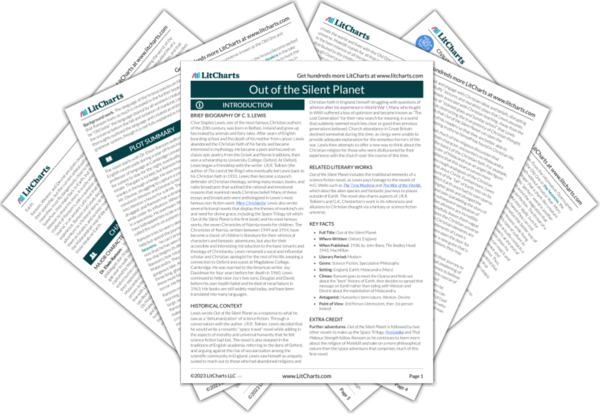Over the course of the novel, Lewis’s protagonist Dr. Elwin Ransom encounters many new things on his journey to Malacandra (Mars) that complicate the way he approaches the unfamiliar and the unknown. Through his changing perspective on space itself, Ransom is shown that those things that can seem disturbing at first might prove to be good when Ransom gives them a chance. After seeing the great marvels and beauties of the heavens (space), Ransom decides that the “old thinkers” – referring to philosophers and astronomers in the ancient world who had such reverence for this celestial place – are more accurate in their assessment of what the space is like. Rather than the dark and empty void Ransom expects from the conventional scientific conception of space, Ransom finds that space is actually full of light and life. By his return flight to Earth, Ransom actually hopes to be scattered throughout the heavens when he dies to become a part of that life when he dies, becoming a part of all that vitality rather than remaining chained to a dead rock of a planet.
More than representing Ransom’s changing beliefs about things he originally finds horrifying, Ransom’s journey through the heavens is also the start of his spiritual awakening. While gazing at the heavens, he feels far better and healthier than he ever has on Earth. Dr. Weston and Mr. Devine, Ransom’s more scientifically-minded companions, explain this away as the effect of solar rays on their bodies, but Ransom gives it a more spiritual significance. While on Malacandra, Ransom also learns that the entire heavens are the home of the Old One and Maleldil the Young, Lewis’ analogues for God and Jesus in this fantastic world. Lewis thus inserts the Christian ideal of “heaven” as a paradise where men are perfected. Lewis frames the heavens as the site of religious salvation, aligning this place with the beautiful and peaceful depictions of Christian heaven and the site of all men’s hopes and aspirations for a better world.
The Heavens Quotes in Out of the Silent Planet
He had read of “Space”: at the back of his thinking for years had lurked the dismal fancy of the black, cold vacuity, the utter deadness, which was supposed to separate the worlds. He had not known how much it affected him till now—now that the very name “Space” seemed a blasphemous libel for this empyrean ocean of radiance in which they swam. He could not call it “dead”; he felt life pouring into him from it every moment. How indeed should it be otherwise, since out of this ocean the worlds and all their life had come? ... No: space was the wrong name. Older thinkers had been wiser when they named it simply the heavens—the heavens which declared the glory…

Unlock explanations and citation info for this and every other Out of the Silent Planet quote.
Plus so much more...
Get LitCharts A+He could not feel that they were an island of life journeying through an abyss of death. He felt almost the opposite—that life was waiting outside the little iron egg-shell in which they rode, ready at any moment to break in, and that, if it killed them, it would kill them by excess of its vitality. He hoped passionately that if they were to perish they would perish by the "unbodying" of the space-ship and not by suffocation within it. To be let out, to be free, to dissolve into the ocean of eternal noon, seemed to him at certain moments a consummation even more desirable than their return to Earth.
It was Dr. Ransom who first saw that our only chance was to publish in the form of fiction what would certainly not be listened to as fact… "what we need for the moment is not so much a body of belief as a body of people familiarized with certain ideas. If we could even effect in one per cent of our readers a change-over from the conception of Space to the conception of Heaven, we should have made a beginning."












